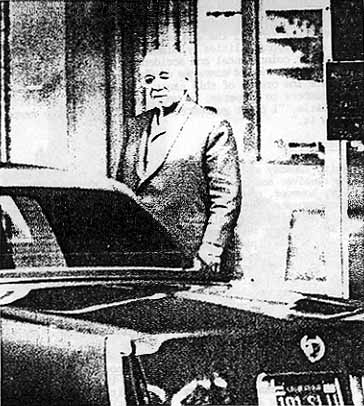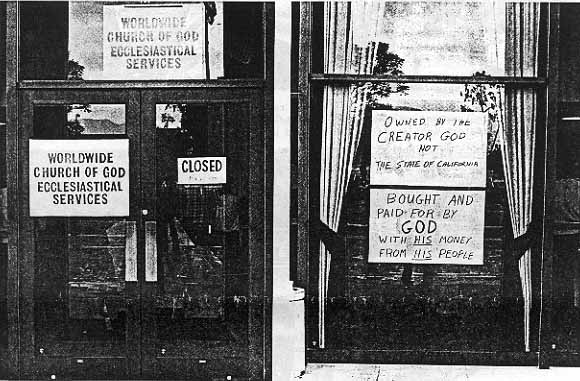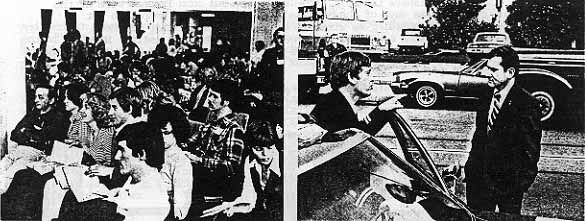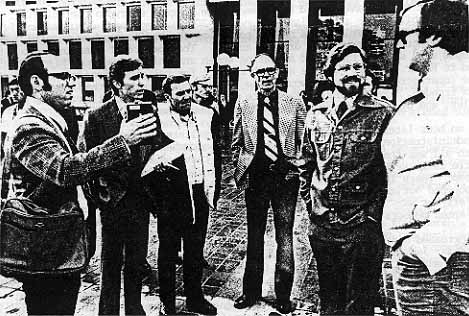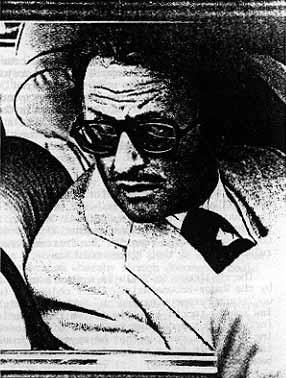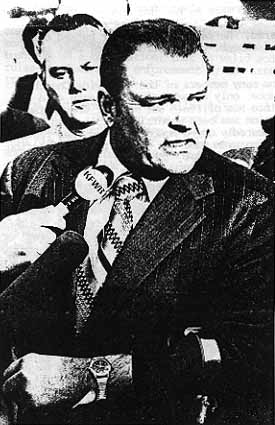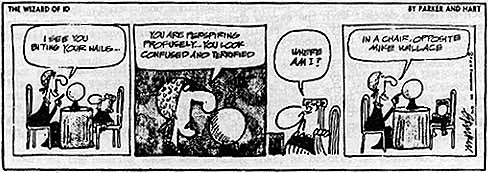AR8 March 14, 1979 (Jan.-Feb. Issue)Dear Friends:
So much has transpired in the Worldwide Church of God (WCG) during the last few weeks that many are understandably having difficulty making sense of the news reports coming out of Pasadena. In this newsletter we hope to bring you up-to-date on what has occurred and shed some light on the chaos surrounding the WGG and Ambassador College. We begin where our last newsletter left off.
Atrocities and Alibis
On January 21, as our last issue went to press, Stanley Rader announced that because of the court-appointed receivership placed on his organization, the WCG would move its headquarters out of California to a "safe haven." Exactly where that would be was not stated, but Rader hinted that he and Herbert Armstrong might begin traveling continuously "to fulfill missionary responsibilities." Said Rader of Pasadena, "There'll be no fresh money coming here." Rader railed against what he described as "atrocities" perpetrated by the receiver, retired Judge Steven Weisman. Rader complained: "It's impossible for us to conduct business as usual."
Rader claimed it was necessary for the headquarters of the church to be moved because the Ambassador College property had been "desecrated" by the receiver's smoking on the premises, by his allowing disfellawshipped members to enter campus property, and by his auditors working on the sabbath. He explained that when the desecration is cleansed, the church would reclaim its Pasadena property. One can only speculate as to where this new doctrine of building desecration and sanctification came from. In coming up with these alibis Rader conveniently forgot that the concert series in "God's House" brings many smokers on campus who regularly light up. He was never upset over that, it seems. Rader also conveniently forgot that Herbert condoned construction workers laboring on the sabbath and holy days to build "God's House" (the Ambassador Auditorium).
Herbert Armstrong leaving a Tucson medical clinic on Jan. 11.
And Herbert never thought it wrong to have disfellowshipped members trod on the "holy ground" before. We all remember, for instance, how Herbert's disfellowshipped daughter Beverly was not only allowed to attend church services but was put on the church's payroll to serve as a hostess on Herbert's "missionary" jaunts.
The next day marked the beginning of the church's annual ministerial conference. Though normally held in Pasadena, this year's conference was held in Tucson, Arizona, where Herbert Armstrong is out of reach of California subpoenas. On the opening day of the four-day conference the 550 attending WCG ministers and their wives heard Apostle Herbert deny all allegations against him, claiming the charges were brought only because the world hates Jesus Christ. He did not answer the charges of the suit in any detail nor offer any real evidence to back up his claim of innocence. What then was the cause of the church's legal difficulties? According to Herbert, it was Garner Ted Armstrong who "spearheaded" the attack after being "brainwashed" by dissidents. He offered no proof of this either.
Sit-in and Lock-out
While Herbert's colorful Tucson performance was interesting, the really big news of the day was occurring in Pasadena where approximately 2,500 men, women, and children of the WCG staged a sit-in at Ambassador College. (Remember when the church condemned such behavior as "demon"-strations? In fact the January 1964 Plain Truth and a 1973 reprint article (#860) entitled "The Christian Attitude-Respect Government Authority" said the following: "Those who refuse to submit to authority...shall receive to themselves damnation.... That's the penalty for any who resist constituted authority. That's the awful judgment God renders an those who incite civil strife, or who create incidents by so-called 'Peaceful demonstrations' or 'sit-ins'....")
Although Rader later said the demonstration was spontaneous and not ordered by him, Ambassador Report was told by many church members that they had received phone calls the previous night from church officials telling them to be there and, if possible, to bring their children. This happened in spite of the fact that Rader had that same day stated he thought there would be "physical conflict." Apparently the safety and welfare of their children was secondary as many WCG parents kept their children out of school and brought even little toddlers to the demonstration. One veteran newsman commented that in all his years of covering the local news it was the first time he had ever seen parents use their children in such a way.
The sit-in brought more legal conflict. In court that morning Judge Title ordered Rader's attorney Allan Browne to tell the demonstrators to disperse and allow the receiver to carry out his responsibilities. Said Title, "All the things going on out there [in Pasadena] are not coincidental and accidental. It doesn't appear that by coincidence thousands of people would converge an this campus.... There has been a determined effort to frustrate the orders of this court." Title told Browne that if he did not advise the church members to disperse, he would order deputy sheriffs to the scene. Browne, however, told Title, "I can't guarantee it." To which Title responded, "I think Mr. Rader can guarantee it."
The "Ecclesiastical Service"
In spite of all this, Tuesday saw no letup in the obstructionist tactics. The sit-in continued, and the receiver and his auditors were still locked out of the administration building. Now, however, church leaders cautioned the demonstrators that the sit-in must assume the atmosphere of a worship service. Explained one church leader, "We want the meeting to be ecclesiastical.... Apparently, it's our only defense." Church members Put up signs saying their demonstration was an "ecclesiastical service," they sang hymns, and listened to the piped-in voice of their apostle speaking from Tucson. Declared Herbert, "Being subject to the laws doesn't always mean to obey them. I wonder if people aren't going to have to go to jail." This brought applause from his flock in the Hall of Administration. Earlier Herbert stated that he would be willing to go to jail himself if it was necessary. However, he has yet to return to California where this boast can be put to the test.
The over-crowded conditions in the administration building caused concern on the part of the Pasadena Fire Department. When the fire department arrived to investigate the possible violation of fire-safety regulations, a fire marshal was told that those engaged in the sit-in could easily exit in case of fire. The Report learned, however, that not only were the doors locked but two-by-fours had been put through some door handles, and some locks had had toothpicks jammed into them to prohibit unlocking. Fortunately, there was no fire.
Ambassador Report Publishers Len Zola, Bob Gerringer, and John Trechak were at the scene for much of the three days of the Ambassador sit-in but were unable to get inside the administration building to witness firsthand the activities of those occupying the building. Some reporters, however, were able to gain entry. Here is an excerpt from a remarkable article by Richard Jenkins and David Willman that appeared in the January 24, 1979, Pasadena Star-News:
Signs at the locked front entrance of the Hall of Administration. (All photos are by Ambassador Report unless otherwise noted.)
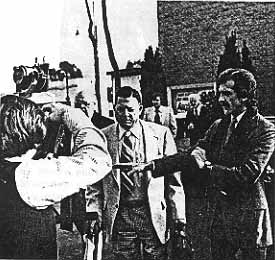
Receiver Steven Weisman (center) on his way back to court. The man on the right is newsman Pat O'Brien of TV station KNXT (CBS).
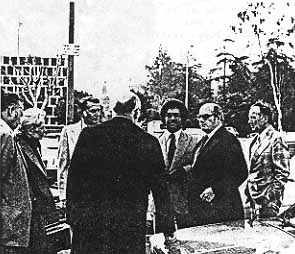
A. Sheridan Atkinson (second from right) confers with members of his staff after being denied access to the Hall of Administration.
As loyal followers of Herbert Armstrong listened to his piped-in voice during the sit-in, fire department vehicles arrived at the scene. A Pasadena Fire Department officer (right photo) was told that demonstrators inside the building would have no difficulty exiting in case of fire.

On the third day of the sit-in sheriff's deputies and Pasadena police officers were mobilized in a nearby park. Fortunately, they were not needed.
"On the first floor, the atmosphere was reserved-some who had arrived during the night slept, while children played tag amidst the grown-ups. Many read Scriptures or attentively listened to taped statements from church leaders - including Herbert W. Armstrong himself....
"Meanwhile, in the fourth-floor nerve center of Armstrong's $80 million church complex, a small cadre of church officers continued to map their struggle against a state investigation into the finances of the embattled church.
"The men and their secretaries, inside the church's posh executive offices, shifted from looks of concern to bursts of confidence. But Armstrong and his top aide-Stanley R. Rader-were not present. In Rader's absence, his massive desk was occupied by a man in his 20s who wore a tailored three-piece suit.
"'We'll occupy the (college) buildings... one at a time,' proclaimed one of the men.
"Earlier the same man, pointing to vaults standing empty and file drawers with no files in an adjacent room, maintained that it took church officials three days to figure out the combinations to the vault locks. Many of the vaults had been off-limits to the church since the state attorney general's office sealed off the ornate facility when the court-ordered receivership began Jan. 3.
"But the official added that the vaults had not been used to contain anything of value. 'We never did use those cabinets or the safe,' he said.
"He then said that the membership list on the church computer system - used to store confidential information - had been scrambled. He added that the scrambling had been carried out to prevent retired Judge Steven Weisman-the court-appointed receiver of the church's financial affairs-from obtaining the full list of contributors to the church.
"A half-dozen other church officials seated around the room were discussing plans to oust Weisman and his forces from another Ambassador building.
"Another of the young men entered the office and reported that personnel hired by Judge Weisman, assumed to have occupied the church's press services building, had not left the building.
"'Perhaps someone could get in there posing as a vendor or something,' someone suggested.
"Those people never leave the building,' the first man complained.
"'They have to sooner or later,' the other replied.
"Moments later, a secretary rushed into the room to announce that 'reliable sources' had indicated that the press services building, assumed to be under Weisman's control, was actually vacant.
"The reaction was both swift and triumphant. One of the men hurriedly gathered a small crew and headed off to bar the doors from the inside with wire and boards.
"'It's like a battle,' a young church officer had explained, prior to the latest skirmish."
Tuesday afternoon attorneys for both sides were once again back in court. Before the hearing Deputy Attorney General Lawrence Tapper told the press, "I don't seek mass arrests." He added that he only wanted the doors unlocked at Ambassador and the unobstructed continuation of the investigation. Judge Title ruled that the receiver and his staff be escorted and protected by sheriff's deputies in order to carry out their duties. The court order allowed the members to continue their sit-in and demonstration unhampered as long as they did not interfere with the business of the receiver and his aides. Title's order came over objections by church attorney Allan Browne who said he feared a repetition of the tragic events at Kent State."
The above photo appeared in a recent edition of The Chronicle. It had this caption: "The three-day sit-in by members of the Worldwide Church of God never reached a confrontation or violent stage. Here, Robert Gerringer and Len Zola (far right), co-publishers of the Ambassador Report, are told to leave campus, by other church members. Gerringer and Zola, although long critical of the Church and its practices, have never been disfellowshipped, they say, with either the required visit from a minister or a letter. They didn't leave." Within days of this incident, co-publishers Bob Gerringer, Bill Hughes, John Trechak, and Len and Margaret Zola received disfellowship letters from Roderick Meredith. However, the intimidating letters are being ignored as the procedures outlined in article 3, section 3, of the church's articles of incorporation were not adhered to, making the disfellowships null and void. In fact, in like manner virtually all disfellowships of the last 20 years are invalid.
Billy Clubs and a Bible
At 8 a.m. Wednesday morning A. Sheridan Atkinson, the chief operating officer for Weisman, was escorted to the administration building by two uniformed sheriff's deputies and a plainclothes officer. The doors of the main entrance of the building were barred by timbers thrust through their perpendicular door handles. An adjacent smaller door had had its inside and outside handles removed. At the rear entrance a deputy accompanying Atkinson attempted to unlock the doors but was unable to. Door handles there had also been removed to prevent Atkinson's entry. Then as the estimated 1,000 members inside the building (there were an estimated 2,000 elsewhere on campus) sang "Onward Christian Soldiers" and other hymns, church deacon Wayne Pyle, who was standing guard outside the door, began arguing vehemently with Atkinson. Yelled Pyle, "If you want to come in, you're going to have to break the door down.... You will have to arrest us.... You are our enemy but we'll pray for you - we'll pray for God to take care of you. "
In front of the assembled newsmen and TV cameras, Atkinson tried to reason with Pyle, explaining that he too was a Christian and believed in moderation in all things. He gave no command to break down the door. Instead he held up not only a copy of Judge Title's court order but an open Bible and said calmly, "I believe in the same God they do." But, he said, "They ought to read the 13th chapter of Romans," referring to Paul's admonition that Christians be subject to civil authority. Atkinson also told Pyle that he agreed that we ought to obey God rather than run but explained, "We're not here to interfere with spiritual matters." Pyle, however, remained adamant while Atkinson, declining to use his full authority, "turned the other cheek!' and walked away to discuss the situation further with his staff.
It is interesting that Stanley Rader, who was on campus that morning was not present during the Atkinson confrontation. It is also noteworthy that after Atkinson left, church loyalists in the auditorium heard a message broadcast by Herbert from Tucson in which he recounted how the apostle Peter had been put in jail. Then Herbert added, "Many of you may have to be subjected to the same thing." All this, of course, happened while he remained safe in Tucson.
At this point the receiver could have used force to gain entry to the building. In fact, that possibility was contemplated as nearly 200 riot-equipped deputies and Pasadena police officers were assembled at a nearby park awaiting the command to move in. But Weisman was reluctant to take such drastic action. The spectre of breaking into a building where people were singing hymns and arresting women and children was not his wish. He sent word to Rader, saying, "I have so much respect for religious freedom and the right not to be interferred with that I would like to work out something that respects your religious freedom." Rader finally agreed to met with Weisman at Allan Browne's office in Los Angeles, and by 3 p.m. a compromise, of sorts, was reached.
About an hour later the demonstrating church loyalists were shocked to see Rader entering the administration building with Weisman, who accompanied him to the executive suite. Obvious to all was the fact that Rader was giving the receiver access to the building. A short while later as Weisman quietly left the Hall of Administration Rader spoke to the weary group: "There is no peace. There is still a war. Not until we get the attorney general punched out and the receiver punched out will there be peace. We're still in a state of all-out war. We've been invaded by an army of the state of California. There were 250 armed members of the sheriff's force ready to break down the doors'"
Cheers greeted Rader's rhetoric, but many were apparently confused as to what had been accomplished. Jackie Knowles of the Pasadena Star-News wrote (1/25/79): "Only Stanley R. Rader was smiling broadly. Worldwide Church of God members who had been camped out for two nights at the church headquarters in Pasadena looked numb and confused after Rader finally escorted a court-appointed receiver into the building Wednesday afternoon. 'The whole idea was to keep out the receiver,' said one of the organizers of the sit-in, Wayne Pyle, with unhappiness written across his drawn face."
Ms. Knowles also quoted another member overheard saying to his minister, "'Why are you so happy if the receiver is still here?'" Indeed, the only concession Weisman had made was that he would move his office from the Hall of Administration to the nearby press facilities building where the church computer is located and where records are stored. Rader acknowledged that many members did not like the results of the sit-in and wanted to demonstrate their faith by being arrested.
By the next day, however, the demonstrators were gone. Dick Lloyd of the Star-News (1/26/79) wrote of what the scene was like once they left: "Magazines were askew, blankets lay strewn about, toys were scattered, chairs stood in disarray, lint covered the carpets, fingerprints tarnished once shiny windows, extension cords rested in agonizing contours across the floor. The blackboard still voiced a lecturer's message on endurance now for the later joys in 'The World Tomorrow.'... Dolls, cups, clothing, wrinkled newspapers and a myriad of other articles added to the disorder." Dick Lloyd also interviewed Deacon Wayne Pyle, who said he was "really bewildered. The whole point of being here was to keep the receiver out, and they let him in." In retrospect, however, he self-righteously thought the whole episode "made the state look like a fool."
Meredith and Company
Meanwhile, while all of this was occurring, a number of announcements were made at the Tucson conference that demonstrated the strength and solidarity of the conservative wing of the church's hierarchy. For instance, the new director of pastoral administration (worldwide) is Roderick Meredith, an arch-myrmidon noted for his almost lemming-like loyalty to Herbert Armstrong. A Meredith protege, Dennis Luker, ordained an evangelist at the conference, is now assistant director of pastoral administration. (Meredith and Luker both held almost identical positions in the pre-1972 era.) The new deputy chancellor of Ambassador College is Raymond McNair, perhaps appointed to this position because of Herbert Armstrong's recent admonitions against the leaven of intellectualism. Acting as administrative assistant to Meredith and Laker is Wilbur Berg. Burk McNair, also ordained an evangelist in Tucson, is now the headquarters area coordinator. Returning to his role as roving evangelist is Gerald Waterhouse (a.k.a., "Mr. Millennium"), long noted for his long-winded, almost hallucinogenic discourses detailing the Armstrongian World Tomorrow.
At the conference Herbert Armstrong decreed that the keeping of birthdays and voting in elections were both again taboo. (For a short time during Garner Ted's era these "sins" had been allowed.) There has also been talk of changing other church doctrines back to what they were in the heyday of the church, but there were no official announcements that this will occur. Even if some old-time doctrines such as Monday Pentecost are resurrected, it is highly unlikely that the old doctrines prohibiting medical treatment and the remarriage of divorced persons would be reinstated, considering Herbert's constant reliance now on medication and his present marriage to a formerly divorced woman. We also doubt that the old makeup doctrine will be reinstated. In a recent Star-News article by Dick Lloyd it was pointed out that Mrs. Ramona Armstrong paints her toenails.
Nevertheless, the church's latest rninisterial appointments indicate that the WCG is indeed returning to the hard-nosed Armstrong conservatism of the past.
Whose Side Is God On, Anyway?
Some ministers believe that if the church could only go backward to the way it was, it would somehow be rescued from its current plight. But one sees little evidence that God is intervening on the WCG's behalf now that the hated "liberals" have been kicked out and the church has taken a more conservative turn.
For instance, while Armstrong loyalists jammed the church's Pasadena headquarters for the three-day sit-in, an attempt was made to form a new church corporation in Arizona with Stan Rader and Herbert Armstrong as its two top directors. On January 24, Nicki Chayet, an attorney for the Arizona Corporations Commission, stated that corporation papers for "the Philadelphia Church of God," as it was to be called, had been filed with her office. (She said the first set of papers came in the mail Monday, January 22 (the day after the press conference in which Rader said he had no idea where the church's "safe haven" would be). However, among the questions left unanswered on the application forms was one requiring disclosure of whether any officer or director of the proposed corporation had been involved with a corporation placed in receivership in recent years. Also left unanswered on the form were questions pertaining to the proposed corporation's fiscal year and business address. The application was rejected.
On January 25, after nearly seven days of deliberation, three Los Angeles-based justices of the California Second District Court of Appeal denied a request from Worldwide Church attorneys to remove the receivership on the church. The church's petition was denied without explanation.
The same day, after being briefed on the case for two hours by Deputy Attorney General Lawrence Tapper, California Attorney General George Deukmejian said that the investigation of the WCG would proceed with no change of direction. The next day, Deukmejian reiterated his position saying that it is the duty of his office to see to it that charitable, tax-exempt funds are spent as prescribed in a nonprofit organization's articles of incorporation. He said the fact that seven judges had upheld the state's actions indicated that they were legal and warranted. But at a news conference the same day Rader blasted Deukmejian for not coming to his aid and said he was "going to make the attorney general eat those words." When asked why he thought the attorney general's office brought the charges, Rader said this concerning his former USC classmate, Deputy Attorney General Tapper (are you ready for this?): "We were in the same class. I was at the top and he was an also-ran.... He is out to get me!"
Atkinson Resigns
Rader's legal maneuverings have netted him no real victories so far, but he has not been without his moments of hope. On January 26, Sheridan Atkinson resigned as Weisman's top aide. Atkinson, the CPA who was the receiver's chief operating officer, said he was unhappy with the way the investigation was proceeding. (While at the college he claimed his phones had been tapped, and under the terms of the compromise agreement of Jan. 24 church financial records were not adequately protected.) On the other hand, Weisman apparently regarded Atkinson as not sufficiently sensitive to certain problems and too explosive. Atkinson said that because of his reputation for getting things done and as an internationally recognized Christian leader, Rader wanted him ousted as chief operating officer, implying that his removal may have been part of the Jan. 24 compromise between Weisman and Rader. Nevertheless, Atkinson commented, "I only want the best for this church. I am willing to be sacrificed as a symbol of government if it will help." Atkinson was replaced by his assistant Lowell H. Duggan. The firm now doing the audit is that of Peat, Marwick and Mitchell, one of the nation's most respected accounting firms and one noted for its expertise in investigations of this type.
On Monday, Jan. 29, Rader's lawyers were again back in court. U.S. District Court Judge Robert Firth heard arguments by Allan Browne that the federal court should intervene and remove the receiver appointed by the state court because, claimed Browne, the church's religious freedoms were being violated. Browne said the receivership's control over the church is as outrageous as telling the Pope that his robes should be synthetic rather than silk.
But Hillel Chodos declared, "I resent the comparison to the Catholic Church. The bishop of Rome doesn't transfer Castle Giddalfo into his own name and then pocket the profits." He went on to say that Rader and his colleagues may have a right to use church funds to entertain at Perino's 'but not to claim tax deductions on such things, transferring a greater tax burden to the rest of the public. Arguing that the constitutional rights argument was trumped up only to thwart the receiver, Chodos remarked, "You cannot perpetrate fraud in the name of religion and then wrap yourself in the flag and call out the name of the First Amendment." Browne's position, said Chodos, was the equivalent of saying, "If a man comes into court and says 'stealing is my religion,' there's nothing you can do about it." The two-hour hearing ended with Judge Firth taking the matter under submission.
Garner Ted Sued
The same day this hearing took place, attorneys Jack Kessler and Robert Palazzo filed a lawsuit against Garner Ted Armstrong on behalf of Stanley Rader. The suit claims that Garner Ted slandered Rader by accusing him of a conflict of interest when Ted made statements urging an independent audit of the WCG's finances. For this, Rader is asking a total of $551 million in damages. A few days later, the accounting firm of Rader, Cornwall, Kessler, and Palazzo filed another lawsuit against Garner Ted. This one is also a slander suit and asks for $13 million in damages. However, Garner Ted told Ambassador Report co-publisher, Robert Gerringer, that on March 1 a judge threw out both suits as legally deficient.
Weisman Gets Support
On the afternoon of Jan. 29 approximately 100 Worldwide Church of God members and ex-members gathered near the Ambassador Press Facilities building in Pasadena to show their support of Judge Weisman and to speak to reporters. The rapid mobilization of about 20 burly Ambassador security guards in front of the employees' entrance and the closing of the gate leading to the entrance made it quite clear that the group would not be allowed to see Weisman. Fortunately the pro-receiver group received only threats from the guards. However, the attitude of the security force was most evident. As a delivery truck backed up near the waiting group, one guard yelled out: "Run 'em over!" Perhaps the nearness of officers from the Pasadena Police Department prevented an "accident."
Nevertheless, despite all the threats, the group waited patiently on the sidewalk until the press and media people arrived. When they did, Howard Clarke, a WCG minister recently disfellowshipped after 25 years of service, read an emotion-filled statement of support for Judge Weisman and the Attorney General.
Said Clarke, "The state is not trying to take over the church. The church is not under attack, and the members of the church aren't under attack. No money has gone unnecessarily to the state. It is a phony issue [this issue] of church and state confrontation. What is being asked is a full accounting before the law. We above all as Christians should be open and above board. Why, if there is nothing to hide, should there be all this obstruction?"
Clarke said there were many members of the church who were supportive of the suit but who were unable to voice their feelings for fear of being disfellowshipped or worse. He stated, "There have been threats, and I know that during this situation there have been some that had to have police protection." This sentiment was later echoed by Dave Morgan and Shirley Timmons, two litigants in the suit who said they were told "...if we could get the six of you [all of the litigants] up against a wall and shoot you, we would." (That's a fine Christian attitude') Dave Morgan said he was even threatened during one of the early court hearings.
Rader didn't stop to say hello.
Disfellowshipped minister Howard Clarke made an emotion-filled statement to reporters in support of the actions of the state.
(Incidentally, Ambassador Report has also received its share of threats too.)
Another member who spoke to the press was Mrs. Jean Myers, who said: "There are a lot of people in the church who would like the church cleaned up. This conspiracy at the top is unholy and ungodly, and we just want it stopped." Mrs. Myers said she still tithes "so that the gospel can go out." But of Herbert Armstrong's international ventures she lamented, "They go to the heads of nations, and instead of preaching Jesus Christ and Him crucified, he gives them this thing about giving and getting and wines and dines them, and they don't teach Christ. They deny Christ!"
Hillel Chodos showed up briefly for the meeting and spoke to some of the members. He said he was glad to see the group's support because, he facetiously added, he was "tired of being the only agent of Satan in this matter." However, there was no levity in his voice when he stated, "By virtue of all this maneuvering to send money to Arizona, he [Rader] is creating financial problems to the church that will make it difficult to pay widows and orphans, but he will pay himself."
During the press conference, Rader appeared briefly in a chauffeur-driven car but declined to get out of the car to speak to the assembled reporters. Instead, he appeared later on a news telecast stating that the church numbers who had participated in the news conference would be disfellowshipped upon identification.
The Paper War
The next week saw more delays in the court's scheduled hearings on the WCG suit. WCG attorneys claimed that Judge Title was prejudiced against their position because of his long friendship with the receiver, retired Judge Steven Weisman. The claim resulted in Title not being able to preside further over the case until this challenge was heard. Chodos, who is a member of the California Commission on Judicial Performance, responded to the accusation against Title, saying, "It's the kind of thing an attorney ought never do unless he has an extreme case. The ground of bias alleged against Judge Title is a cheap shot." This was especially true, he said, because Browne waved any objection to Title when at the beginning of the proceeding he was told by Title that Weisman was a long-time friend.
Nevertheless, attorneys for both sides met, ostensibly to decide on a judge to hear the challenge against Title. But when they could reach no agreement, the matter went to the chairman of the state Judicial Council, Supreme Court Chief Justice Rose Bird who decided that the challenge against Title would be reviewed by Orange County Superior Court Judge George Francis. He in turn considered arguments submitted by both sides and ruled on Feb. 5 that Title would stay.
The challenge to Title is a good example of the type of delaying legal tactics used by the Rader-Browne axis. Their objection to Title had as little merit as their drummed-up "state persecuting church" argument (which Chodos referred to as "a kind of first-year law school tactic"). It's gotten them little if any results while costing the church a fortune. But according to Rader this is necessary to keep the investigators from reviewing financial records that he says will prove him innocent. The argument doesn't go very far before it falls on its face. However, the constant legal maneuvering and obstructions have had some effect.
Weisman Resigns
On Feb. 6 receiver Steven Weisman told Judge Title that he had had enough. He said the difficulties he was being faced with and the stress it was putting on his health were forcing him to resign. "I'm doing this with regret," he said. "I've never backed off from a job in my life. But I don't need this harassment, this obstruction of what ought to be an orderly job."
Judge Weisman has received strong support from many members of the Worldwide Church of God and alumni of Ambassador College. For instance, only a week before, Weisman told one reporter that letters of support were flooding into his office. But much of what Weisman has been subjected to by this Christian organization has been agonizing for the man. Rader must take much of the blame for this. He has repeatedly urged noncooperation, has repeatedly belittled Weisman, and on at least one occasion even made fun of his polio affliction, comparing him to crippled Chester of "Gunsmoke." Said Rader, "You know, all of us can use a cane as a prop." Ambassador Report believes that insulting judges is not just un-Christian, it's stupid. But Rader apparently feels differently because, like a little kid who hasn't been taught not to pull down his pants in public, he even had his comments on Weisman published in the Feb. 19 Worldwide News.
Weisman is not the only person who has come under Rader's fire. Rader has been before the TV cameras almost daily attacking the attorney general, his subordinates, judges, and attorney Hillel Chodos, whose name he repeatedly mispronounces as "Chomos." One of our sources insists that this slip of the tongue is actually Rader's way of insulting Mr. Chodos. We, however, believe that Mr. Rader would not stoop to that type of thing and that, in fact, the habit, like his somewhat lilting cadence, is nothing more than some type of speech impediment. Yet we do wonder why, if this is the case, the mispronouncing of Mr. Chodos' name is repeatedly transliterated as "Chomos" in the Worldwide News.
Speaking of funny papers, remember Herbert's boast of co-hosting a benefit with the Queen of England? And the one about being nominated for a Nobel Prize? Well, the Worldwide News reported that Rader is considering running for attorney general of California. Oh, well, moving right along,...
The Paper War Escalates
On Feb. 6 legal maneuvering by Browne continued. An attempt was again made to take the receivership issue out of Title's court to another. Commented Title, "Very candidly, you've failed on your motion to disqualify me, and now you're trying to do it through the back door." The matter went to Presiding Judge David Eagleson who ruled that while ordinary matters of law would be referred to regular pretrial civil courts as in other civil cases, all matters directly or indirectly involving the receiver and his duties would be heard by Judge Title.
On Feb. 9 Rader's lawyers, Allan Browne, Allan Cooper, Allan Gabriel, and George Scheavelli, went before the state's Second District Court of Appeal asking for an immediate stay of Title's receivership order. That attempt, like others before, failed. However, the one thing accomplished by these time-consuming maneuvers was the repeated delaying of a hearing to decide whether or not Stanley Rader would be removed by the court from his position as the church corporation's acting executive head. Such an action was contemplated because of Rader's obstinant refusal to cooperate with the court-appointed receiver. The hearing on this motion may yet materialize.
On Feb. 13 Allan Browne was again back in Title's court, arguing that the receivership should be lifted. He suggested that a bond could be posted by the church to protect the church's assets while an appeal of the receivership was made. But Deputy Attorney General Tapper argued vigorously against such a move. So did the receiver, Steven Weisman, who temporarily remained in his position pending a decision on his replacement. Stated Weisman, "I want to respond to Mr. Browne's lack of knowledge to what's going an out there. It was only this morning that we had our mail service restored. There is no cooperation out there yet. We get our mail directly from the post office because they're opening our mail." Title told Browne to draft a proposal of a system whereby church documents could be protected without a receiver. In the meantime the receivership was to continue.
On Feb. 20, the WCG had another setback. A group of WCG loyalists who call themselves the Committee for Defense of Religious Freedom had petitioned the court to allow them to enter the legal war that was raging. Richard Osborn, the attorney for the group, said that the church's hierarchy was not in a position to protect the rights of the members because it lacked credibility in the eyes of the court. Osborn said the group's action was done independent of the church and was not being financed by it. (Osborn told the Star-News, however, that his first contact with church members came when he was called by Rader to the Ambassador campus during the big January demonstration.)
Nevertheless, the committee's attempt failed. Judge Robert Weil didn't feel additional defendants were necessary. Osborn had argued that his clients should be allowed to become separately represented parties to the suit because the issues involved were church and not corporate problems. But Judge Weil disagreed, saying, "The church is doing business as a corporation; that is valid and uncontested. So it submits itself to the rules - including the enforcement by the attorney general - of the rules of a charitable trust."
The next day, attorneys Allan Browne and Hillel Chodos were again in debate before Judge Title. Testimony was heard from several witnesses including Lowell Duggan, the receiver's chief operating officer, who told of the continued obstruction to his work. He said his requests for information concerning corporate aircraft, real estate transactions, and other financial dealings had been denied. Several witnesses testified that financial documents asked for by auditors or Employees of the receiver were "screened" by church attorneys if it was suspected that they might be "ecclesiastical. " Chodos, however, said that "99% of the so-called ecclesiastical records are really the sensitive ones" that church leaders did not want to divulge.
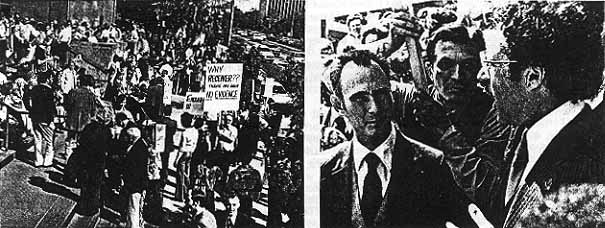
On Feb. 13 as attorneys for both sides again debated the receivership issue, loyal followers of Herbert Armstrong demonstrated outside the court building. The photo on the right shows Rader's lawyer Allan Browne (far right) talking to the demonstrators.
The hearing left Judge Title convinced that the receivership was singly not working. Over strong objections by Chodos, Judge Title decided that he would in one week issue an order lifting the receivership. Church members were elated. Rader, however, wasn't thrilled. For weeks he had claimed that had there been no receiver he would have gladly turned over all records. He had claimed he had nothing to hide and was only fighting the receivership on principle. Now, Title said he would remove the receiver and give the WCG "one final opportunity to show good faith." But, Title made it very clear that the order would be contingent on alternative plans for the continuance of the investigation. He warned that if the removal of the receiver didn't produce the results he hoped for, it would be reinstated. March 1 was the date set for the next hearing on the matter.
No Bodies?
The following morning Rader held another of his frequent news conferences. He announced that he and the Worldwide Church would cooperate fully with the continuing audit of the church's finances. Now that was news!
But only hours later the war was back on again! That afternoon members of the receiver's staff and auditors attempted to close out the office of the receiver as was instructed by Judge Title only the day before. Someone alerted the Ambassador security department. Within minutes about a dozen men arrived to block the receiver's staff from loading audit records into the back of a car. Weisman's secretary feared violence and called the Pasadena police. Several officers were immediately dispatched to the scene. The confrontation ended when, in the interest of peace, the receiver's staff moved the boxes back into the building. After numerous telephone discussions between Judge Title, Steven Weisman, and the church's attorneys, Allan Browne agreed to allow the accountants' work papers to be removed. During the discussions Stan Rader and Ralph Helge arrived on the scene in a black Cadillac limousine. Helge was overheard saying to his men with a laugh, "Where are all the bodies? You haven't done your job if there are no bodies."
At Rader's news conference earlier that day Rader said that those who had initiated the legal action against the church would be punished, making reference to the church's $700 million federal suit against the California attorney general's office. A few hours later, Rader's prophecy notwithstanding, U.S. District Court Judge Robert Firth said that a judgment in the church's favor in that case would "create unnecessary state-federal friction" and the suit was thrown out.
Title's Injunction
On March 1, as scheduled, Judge Julius Title decided that the receivership which had been on the church since Jan. 3 would be dissolved. This meant that the church's business affairs would again be under the control and direction of its religious leaders. But those church loyalists who hoped that this would stop the investigation of the church were badly disappointed. First of all, the investigation of the church would continue under the auspices of the attorney general's office. Second, the dissolution of the receivership would technically not occur until Title signed an injunctive order that was to be drafted. And that would not occur until Weisman (in supposedly about 12 days) completed his report to the court. Title made it very clear that his injunctive order would both prohibit the sale of church properties and fixed assets unless 30 days notice was given to the attorney general and that the attorney general's auditors would be given access to all the financial records they needed.
Over strong protects by Browne, Title said the attorney general's investigators "are entitled to look at whatever they want to - for a full and complete audit." Included in this is access to a computer terminal and copy machines. Browne howled in protest: "They're asking to get into every internal financial document the church has had in 20 years." But Hillel Chodos countered by saying, "No independent accounting of church monies has ever been made.... The people have a right to an accounting of every penny." Title ordered that the identities of church members be kept confidential in the audit. But, said Title, all monetary matters were within the purview of the attorney general's audit He also stipulated that henceforth church officials were required to turn over financial documents within five hours of their being requested by the auditors. He made it clear that the church was getting "one final opportunity" to cooperate. Said Title, "The hallmark test is... reasonable, cooperative, and nondisruptive conduct."
Within hours of the hearing Rader was hinting that, as before, he would not cooperate. A few days later Rader openly told reporters he would definitely not cooperate with the court-ordered audit of the church's books. When asked by reporters why he had previously said he would cooperate if the receivership was lifted, Rader said he had changed his mind.
The legal war was again on. On Monday, March 5, Rader filed a $13 million lawsuit against Deputy Attorney General Lawrence Tapper and attorney Hillel Chodos. Totally unperturbed, Chodos told the Star-News: "This complaint will be given the attention it deserves."
The next day, Rader's lawyers were at it again, this time before Los Angeles Superior Court Judge Thomas T. Johnson. They argued that the state had no legal grounds to file a suit and requested that the judge find the state attorney general's complaint legally insufficient. Judge Johnson took the church's motion for a demurrer under submission. Informed observers do not believe such tactics will prove beneficial to the church however. Church lawyers have been unsuccessful before three superior court judges, a federal judge, a state appellate court three-judge panel, and the state supreme court.
Receivership Resurrected?
March 12 was to have been the day that the receivership officially ended. But Judge Title had warned that Rader and the WCG must first prove itself with good conduct. They flunked the test. Judge Title stated, "Very candidly, the incredible resistance of the defendants to this audit has to raise a reasonable question in one's mind. It has to make a reasonable mind suspect that perhaps someone out there doesn't want that audit." Title appointed a new receiver, David Ray, a 49-year-old Beverly Hills lawyer and CPA with 15 years experience as a receiver. However, Title said he would allow the WCG to post a $1 million bond that would allow a stay of the order while church attorneys appealed the decision.
Rader immediately set about to raise the money for the bond. But as of this morning (March 14) the bond has not been posted. We were told only last evening that church members were being called and asked to immediately contribute $10 or more for the bond. In the mean time WCG loyalists are again engaged in a "spontaneous" sit-in at Ambassador College, vowing to keep out the new receiver. Yesterday (March 13) WCG employees were asked to forgo a paycheck or two to help the organization through its present financial difficulties. (Rader said he too would sacrifice a portion of his pay to the church!)
We find it amusing that through all of this Quest magazine has yet to be jettisoned and the AICF concert series continues on.
The Big Sandy Scandal
One of the reasons a receivership was imposed on the Worldwide Church of God was because it was believed that there were improprieties in the sale of the Big Sandy property, which was to have been transferred in early January of this year. As we reported in our last issue Judge Title could find no impropriety in that transaction and ordered that the sale be allowed to be completed. A series of strange events then followed. With Rader's apparent approval, a group of church members from Milwaukee, Wisconsin, filed a class-action lawsuit that sought to keep the proceeds of the sale of the Big Sandy campus in escrow until the litigation with the state of California reached completion. U.S. District Court Judge William Steger in Tyler, Texas, issued a ex parte temporary restraining order in accordance with their wish. The order would have effectively prevented money from the sale going to the Pasadena church headquarters under the receiver's control.
But as it turned out there was no sale! The deal never went through, and the circumstances surrounding the entire matter leave many questions unanswered. We do know that the church failed to deposit with the escrow company the documents and records needed to show clear title to the Property. As a result of this, southern evangelist William Menge, who had planned to purchase the property, bowed out of the deal.
However, according to Menge's attorney Hodge Dolle Jr., Menge has since been unable to recover over $500,000 he already paid out for the property. That money was not paid through escrow as is normally the case but directly to church leaders! Why was this done? According to Dolle, "It was good faith money required by the church. It was make or break on that point." Dolle said they had no luck in retrieving the money from the church officials, and they were preparing to sue for the return of the money. Rader has not commented on the matter.
Garner Ted on the Move Again
We don't wish to take much space in this issue to comment on Garner Ted's activities of late. Those of you who are interested in what he is up to can write to his new organization (P.O. Box 2525, Tyler, Texas 75710) for his monthly publication. However, we'd briefly like to mention that Garner Ted's new free booklet "The True Church - Is It Organized?" is most interesting. We think it starts with a number of erroneous assumptions and ends with some even more erroneous conclusions. However, it also has some good information, and we think it's well worth reading, especially from the standpoint of seeing just how much Garner Ted has changed on the "true church" doctrine. We're waiting with bated breath to see how his father responds to the charges against him found in this new booklet.
"60 Minutes" Does It to Rader
For the last two years or so it seems that not a week has gone by that we didn't receive at least one or two letters from readers suggesting we contact the producers of "60 Minutes," the popular CBS Sunday night TV program. Well, some time ago we did. Until now we have not been able to divulge that we have indeed had extensive contact with producer Norman Gorin and his staff. They asked that that fact be kept secret until now. "60 Minutes" is doing at least one segment on the WCG, and if it hasn't already aired by the time you read this, it will very shortly.
We haven't seen the script or a tape of the program, but Allan Maraynes, the researcher for the program, told us it was a real winner. Stanley Rader was "courted" for months by the "60 Minutes" people and was so confident he could "use them" that he was even quoted as saying he had them in the palms of his hands. Well, it didn't work out that way. Ambassador Report and others had provided "60 Minutes" with extensive documentation of Rader's activities. In over three hours of being interviewed on camera Rader said some remarkable things. But the capstone of the interview came when Mike Wallace produced a tape recording of Herbert Armstrong saying he would, in effect, like to get rid of Rader because Rader was trying to take over the church. (We have learned that the tape was made during a discussion between Herbert and Wayne Cole sometime on or around January 1 of this year.) Rader flew into a rage and had Mike Wallace and his crew evicted. (It'll all be shown an the program.)
Rader then went to a pre-scheduled news conference where, almost completely ignoring the whole purpose of the conference, he railed against the press. Describing the interview with Mike Wallace as "one of the most heinous experiences" of his life, Rader said the tape recording of Herbert's voice was obtained illegally and that he was going to take legal action against CBS. He never once denied that the tape was authentic, however.
Rader's conduct at the conference was nothing less than outrageous. When Pat O'Brian, a newsman with the local CBS affiliate, tried to ask a question of Rader, Stan refused to answer because the newsman was with a station that carried "60 Minutes." Rader yelled, "The press is the press! They can't be trusted and they're irresponsible!" Rader then threw his pencil, grabbed up some papers, and while mumbling invective, stormed out of the room in a fury.
Comic Strip Friends
During the last few months a comic strip called "The Wizard of Id" has achieved immense popularity in certain WCG circles. Some people see uncanny similarities between the characters in the strip and some individuals they know. The Parker and Hart strip is available in paperback at most fine bookstores. Here is an appropriate example:
Meredith the Sage
Before we forget! Recently an Ambassador College faculty member showed us an article he found in the September 1964 Plain Truth condemning civil disobedience. It's author was Roderick C. Meredith, the WCG's current director of pastoral administration. The advice he gave then is most apropos for WCG ministers now. Here is an excerpt we thought was remarkable:
"In his second epistle, the Apostle Peter warned that in our day there would be false teachers creeping in to lead the people into rebellion against constituted authority. He stated: 'But there were false prophets also among the people, even as there shall be false teachers among you, who privily shall bring in damnable heresies, even denying the Lord that brought them, and bring upon themselves swift destruction' (II Pet. 2:1).
"In verse 10, Peter described the attitude of these self-appointed leaders: 'But chiefly them that walk after the flesh in the lust of uncleanness, and despise government. Presumptuous are they, self-willed, they are not afraid to speak evil of dignities.'...
"It is the responsibility of every true minister of Christ to preach submission to law and constituted authority. Most of all, everyone should be taught wholehearted obedience to the laws and ways of the Great God who rules over the kingdoms of men.
"The extent to which modern preachers are failing to carry out this responsibility demonstrates the extent to which they are false ministers...."
You Can Fool Some of the People...
It is becoming increasingly evident that both Rader and Herbert believe the entire American public "just fell off a turnip truck." The WCG is now running expensive full-page ads in major U.S. newspapers in an attempt to marshal public opinion against the California attorney general. One such ad appeared in the Los Angeles Times on March 13. The banner of the ad read, "Attorney General Declares: All Church Assets And Records Are Public Property." Of course, that is totally ridiculous. The ad, which bears the signiture of Herbert Armstrong, goes on to insinuate that the state intends to take over all churches and that the WCG is only the first on their list. Writes ad-man Armstrong: "This intention of the State to claim public ownership of all Church property, was, prior to that date [Jan. 2], kept a secret from the public." Herbert goes on to say that the WCG is fighting the state, not just to protect itself, but on behalf of all churches and individuals who believe in freedom of religion and in the separation of church and state.
Remember how Herbert used to rave that in his millennium there would be no separation of church and state? How there would be no freedom of religion? How true Christians today should not be involved in political matters? How all churches other than the WCG were "Satan's churches"? Well now, in this ad, Herbert writes:
"All Americans must be committed to the preservation of the integrity of our religious institutions and the freedom to exercise our religious rights.
"How can you help-what can you as an individual do?
"Let everyone know that you as an American will not stand by and allow our freedoms to be so callously subverted. Contact your church pastor, write your congressman, write your senator, contact the media and let your views be known!"
Actually, this is not bad advice. Many of you have written to us asking if there is something you can do. Yes there is. Make your views known. We think the best place to write is to the attorney general of California. Don't write to the receiver, the auditors or the deputy attorney general. They have little time to read, let alone answer, mail. However, we believe letters to the state attorney general's office will make a difference. Here is the address: The Honorable, George Deukmejian; Attorney General of California; 555 Capitol Mall, Suite 350; Sacramento, CA 95814.
To those of you helping to make this publication possible, our sincere thanks.
The Publishers
Ambassador Report is published bimonthly as finances allow. Publisher-Editors are: Robert Gerringer, Bill Hughes, Mary E. Jones, John Trecbak, Leonard Zola, and Margaret Zola.

